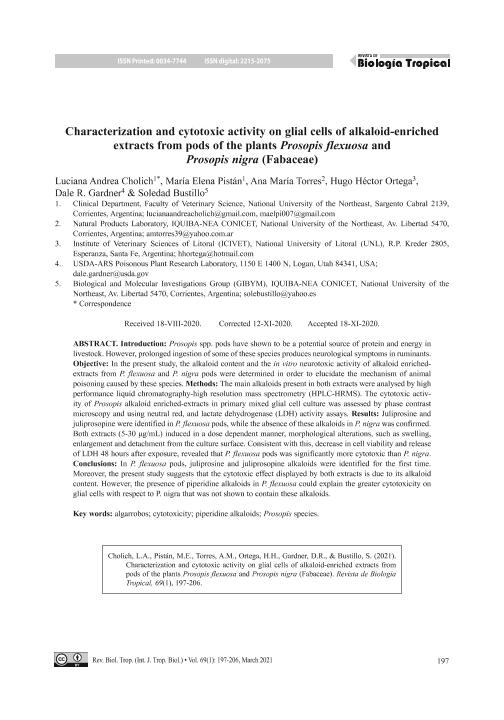Artículo
Characterization and cytotoxic activity on glial cells of alkaloid-enriched extracts from pods of the plants prosopis flexuosa and prosopis Nigra (Fabaceae)
Cholich, Luciana Andrea ; Pistan, Maria Elena
; Pistan, Maria Elena ; Torres, Ana Maria; Ortega, Hugo Hector
; Torres, Ana Maria; Ortega, Hugo Hector ; Gardner, Dale R.; Bustillo, Soledad
; Gardner, Dale R.; Bustillo, Soledad
 ; Pistan, Maria Elena
; Pistan, Maria Elena ; Torres, Ana Maria; Ortega, Hugo Hector
; Torres, Ana Maria; Ortega, Hugo Hector ; Gardner, Dale R.; Bustillo, Soledad
; Gardner, Dale R.; Bustillo, Soledad
Fecha de publicación:
10/2020
Editorial:
Revista de Biología Tropical
Revista:
Revista de Biología Tropical
ISSN:
0034-7744
e-ISSN:
2215-2075
Idioma:
Español
Tipo de recurso:
Artículo publicado
Clasificación temática:
Resumen
Introduction: Prosopis spp. pods have shown to be a potential source of protein and energy in livestock. However, prolonged ingestion of some of these species produces neurological symptoms in ruminants. Objective: In the present study, the alkaloid content and the in vitro neurotoxic activity of alkaloid enriched-extracts from P. flexuosa and P. nigra pods were determined in order to elucidate the mechanism of animal poisoning caused by these species. Methods: The main alkaloids present in both extracts were analysed by high performance liquid chromatography-high resolution mass spectrometry (HPLC-HRMS). The cytotoxic activity of Prosopis alkaloid enriched-extracts in primary mixed glial cell culture was assessed by phase contrast microscopy and using neutral red, and lactate dehydrogenase (LDH) activity assays. Results: Juliprosine and juliprosopine were identified in P. flexuosa pods, while the absence of these alkaloids in P. nigra was confirmed. Both extracts (5-30 μg/mL) induced in a dose dependent manner, morphological alterations, such as swelling, enlargement and detachment from the culture surface. Consistent with this, decrease in cell viability and release of LDH 48 hours after exposure, revealed that P. flexuosa pods was significantly more cytotoxic than P. nigra. Conclusions: In P. flexuosa pods, juliprosine and juliprosopine alkaloids were identified for the first time. Moreover, the present study suggests that the cytotoxic effect displayed by both extracts is due to its alkaloid content. However, the presence of piperidine alkaloids in P. flexuosa could explain the greater cytotoxicity on glial cells with respect to P. nigra that was not shown to contain these alkaloids.
Palabras clave:
ALGARROBOS
,
CYTOTOXICITY
,
PIPERIDINE ALKALOIDS
,
PROSOPIS SPECIES
Archivos asociados
Licencia
Identificadores
Colecciones
Articulos(CCT - NORDESTE)
Articulos de CTRO.CIENTIFICO TECNOL.CONICET - NORDESTE
Articulos de CTRO.CIENTIFICO TECNOL.CONICET - NORDESTE
Articulos(ICIVET-LITORAL)
Articulos de INST. DE CIENCIAS VETERINARIAS DEL LITORAL
Articulos de INST. DE CIENCIAS VETERINARIAS DEL LITORAL
Articulos(IQUIBA-NEA)
Articulos de INSTITUTO DE QUIMICA BASICA Y APLICADA DEL NORDESTE ARGENTINO
Articulos de INSTITUTO DE QUIMICA BASICA Y APLICADA DEL NORDESTE ARGENTINO
Citación
Cholich, Luciana Andrea; Pistan, Maria Elena; Torres, Ana Maria; Ortega, Hugo Hector; Gardner, Dale R.; et al.; Characterization and cytotoxic activity on glial cells of alkaloid-enriched extracts from pods of the plants prosopis flexuosa and prosopis Nigra (Fabaceae); Revista de Biología Tropical; Revista de Biología Tropical; 69; 1; 10-2020; 197-206
Compartir
Altmétricas



